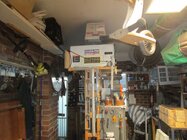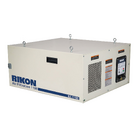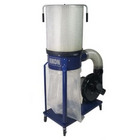I have a couple of dust collectors one Jet the other is a Jet knock off by the look of it. the non Jet is a atmospheric type that cleans up the dust hanging in the air. Recently it has started to flip the RCD or Residual Current Device that compulsory on all house and commercial wiring boards nationwide. Which probably means its motor, darn. Well I could change it as its over 25 years old. But in my experience they rarely play up and usually the fault lies with the appliance, and of course its high in the middle of the shop surrounded by gear that came after installation.
-
December 2025 Turning Challenge: Single Tree! (click here for details) -
Congratulations to Bob Henrickson, People's Choice in the November 2025 Turning Challenge (click here for details) -
Congratulations to Steven Gordon for "Dropped Ice Cream Cone" being selected as Turning of the Week for December 8, 2025 (click here for details) -
Welcome new registering member. Your username must be your real First and Last name (for example: John Doe). "Screen names" and "handles" are not allowed and your registration will be deleted if you don't use your real name. Also, do not use all caps nor all lower case.
You are using an out of date browser. It may not display this or other websites correctly.
You should upgrade or use an alternative browser.
You should upgrade or use an alternative browser.
Some days
- Thread starter hughie
- Start date
I have a couple of dust collectors one Jet the other is a Jet knock off by the look of it. the non Jet is a atmospheric type that cleans up the dust hanging in the air. Recently it has started to flip the RCD or Residual Current Device that compulsory on all house and commercial wiring boards nationwide. Which probably means its motor, darn. Well I could change it as its over 25 years old. But in my experience they rarely play up and usually the fault lies with the appliance, and of course its high in the middle of the shop surrounded by gear that came after installation.
Is the RCD (which I assume is similar to GFCI or AFCI, Ground Fault or Arc Fault, in the US?) absolutely required even on circuits with motors? I had to completely remove fault protection from the 250V 30A breaker I use for my Powermatic. The lathe uses a VFD, which are just flat out incompatible with GFCI or AFCI (or any combination) just due to the nature of how they function. When I had the G/AFCI breaker in place, it would trip within 10-20 seconds of turning the lathe on, every single time. Once I removed it, the lathe worked perfectly, and has ever since. I also tried a receptacle with GFCI protection, but it, too, was always tripped. The receptacle was a lot harder to source and very expensive, so I returned it pretty promptly.
The thing about motors, is they do tend to arc a little bit, right? There is no exclusion for motor appliances with RCD?
RCD's work just fine motors. I am not sure how RCD's compare to your set up. There a couple of known exceptions in new houses often the oven/cooktop is wired with its own circuit independent of the RCD as elements have been known to leak and in the past the fridge circuit. There's virtually no time delay when it trip [ 25–40 milliseconds ], they are so sensitive you cant use a metre to check the circuit, testing is usually done via the test button on the RCD.Is the RCD (which I assume is similar to GFCI or AFCI, Ground Fault or Arc Fault, in the US?) absolutely required even on circuits with motors? I had to completely remove fault protection from the 250V 30A breaker I use for my Powermatic. The lathe uses a VFD, which are just flat out incompatible with GFCI or AFCI (or any combination) just due to the nature of how they function. When I had the G/AFCI breaker in place, it would trip within 10-20 seconds of turning the lathe on, every single time. Once I removed it, the lathe worked perfectly, and has ever since. I also tried a receptacle with GFCI protection, but it, too, was always tripped. The receptacle was a lot harder to source and very expensive, so I returned it pretty promptly.
The thing about motors, is they do tend to arc a little bit, right? There is no exclusion for motor appliances with RCD?
Heres a brief description
- RCDs monitor the current flowing through the circuit's live and neutral wires.
- Normally, the current flowing into and out of a load is balanced.
- When a fault occurs (e.g., a person touches a bare conductor), some current may leak to the ground, creating an imbalance.
- RCDs detect this imbalance and quickly disconnect the power supply, often within milliseconds, to prevent harm.
That is exactly what a GFCI (Ground Fault Circuit Interrupter) does.RCD's work just fine motors. I am not sure how RCD's compare to your set up. There a couple of known exceptions in new houses often the oven/cooktop is wired with its own circuit independent of the RCD as elements have been known to leak and in the past the fridge circuit. There's virtually no time delay when it trip [ 25–40 milliseconds ], they are so sensitive you cant use a metre to check the circuit, testing is usually done via the test button on the RCD.
Heres a brief description
- RCDs monitor the current flowing through the circuit's live and neutral wires.
- Normally, the current flowing into and out of a load is balanced.
- When a fault occurs (e.g., a person touches a bare conductor), some current may leak to the ground, creating an imbalance.
- RCDs detect this imbalance and quickly disconnect the power supply, often within milliseconds, to prevent harm.

Residual-current device - Wikipedia
More then you probably wanted to know.
RCD's work just fine motors. I am not sure how RCD's compare to your set up. There a couple of known exceptions in new houses often the oven/cooktop is wired with its own circuit independent of the RCD as elements have been known to leak and in the past the fridge circuit. There's virtually no time delay when it trip [ 25–40 milliseconds ], they are so sensitive you cant use a metre to check the circuit, testing is usually done via the test button on the RCD.
Heres a brief description
- RCDs monitor the current flowing through the circuit's live and neutral wires.
- Normally, the current flowing into and out of a load is balanced.
- When a fault occurs (e.g., a person touches a bare conductor), some current may leak to the ground, creating an imbalance.
- RCDs detect this imbalance and quickly disconnect the power supply, often within milliseconds, to prevent harm.
That's how GFCI works. They definitely don't work with a VFD... Is RCD a breaker, or is it something more complex?
primarily a safety breakerThat's how GFCI works. They definitely don't work with a VFD... Is RCD a breaker, or is it something more complex?
There are dust collectors and there are dust filters. You show a dust filter.
Lol and these headings/titles etc will vary with each country and so for me they are all dust collectors. They all collect, extract, filter, take away, remove, clean, etc.
The thing is, it dang well died and its in an very awkward position to remove by one man and I am comin into my busiest time of turning, as I said some days are diamonds
The thing is, it dang well died and its in an very awkward position to remove by one man and I am comin into my busiest time of turning, as I said some days are diamonds
Last edited:
Well, since you mention it, I see these terms used most often.
Dust extractor.
View attachment 75065
I bought a Jet. They call this an "air filter." I also have a Fein Turbo I (basically a real nice shop vac), which they call a "dust extractor"...
I guess there's no standard nomenclature. 
The dust collector/filter/cleaner/extractor names that are tossed around are sometimes vague.
To me, the dust collector creates a strong suction to remove air, dust, and chips at the point of creation (sanding, turning, sawing).
What I usually hear called an air cleaner/filter removes extremely fine particles that float around in the air. My Jet “Air Filtration System” is a box that hangs from the ceiling and slowly removes these fine particles. When I had the shop in a garage with no cyclone but used a shop vac, my Dylos particle counter let me know about fine dust in the air. When I left the space with the filter running, in 20 minutes or so the particle count dropped back to normal.
The instructions say for most efficiency mount the Filtration box near the ceiling or fastened high near on a wall. The location is important, best near the middle a long wall, considering the dust creation area and the intended air circulation patterns. Regardless of DC or filter, good ppe is recommended while making dust!
I also keep an air filtration unit in the back room of my shop, where during peacock/guinea/chicken incubation and raising season the quantity of fine dust they make has to be seen to be believed.
I have about 150 baby chickens 1-5 days old in a stack of heated brooders. People should be picking them up any day now. (for some reason more people want to produce there own eggs this year, can’t figure it out…


I may have extras this year. Anyone want some free chicks? (The peafowl are not free!I)
JKJ
To me, the dust collector creates a strong suction to remove air, dust, and chips at the point of creation (sanding, turning, sawing).
What I usually hear called an air cleaner/filter removes extremely fine particles that float around in the air. My Jet “Air Filtration System” is a box that hangs from the ceiling and slowly removes these fine particles. When I had the shop in a garage with no cyclone but used a shop vac, my Dylos particle counter let me know about fine dust in the air. When I left the space with the filter running, in 20 minutes or so the particle count dropped back to normal.
The instructions say for most efficiency mount the Filtration box near the ceiling or fastened high near on a wall. The location is important, best near the middle a long wall, considering the dust creation area and the intended air circulation patterns. Regardless of DC or filter, good ppe is recommended while making dust!
I also keep an air filtration unit in the back room of my shop, where during peacock/guinea/chicken incubation and raising season the quantity of fine dust they make has to be seen to be believed.
I have about 150 baby chickens 1-5 days old in a stack of heated brooders. People should be picking them up any day now. (for some reason more people want to produce there own eggs this year, can’t figure it out…


I may have extras this year. Anyone want some free chicks? (The peafowl are not free!I)
JKJ
Money for nothin' and your chicks for free. (courtesy of Dire Straits)I may have extras this year. Anyone want some free chicks? (The peafowl are not free!I)
JK
I guess there's no standard nomenclature.
Always leads to fun times!
My Jet 1000B, I think it is, is called an Air Filtration System. I use that every time I'm out there. It does a pretty good job. Early on, I was confused about the blue outer filters. I thought you had to toss em, so early on I was buying new ones, any time I saw them available. This was, oh, mid 2020? The filters at the time were, at least at the local Woodcraft, like $11.95 each. I bought several...then grabbed another oh, a couple of months later, when more showed up at Woodcraft. I wasn't paying attention, but the price on the filters had jumped...to $39.95!! I accidentally bought another one at Rockler some time later, and didn't check the price, it too was like $40. Well, I stopped buying more after that. Then, even more time later, I RTFM....and those filters can be cleaned and reused....  So, I have about 5 or 6 of them left. Today, the freakin things are $45.99!! What a ripoff! (I even noticed that the mid-grade filters for my house HVAC, have also about tripled in price.) Egregious!
So, I have about 5 or 6 of them left. Today, the freakin things are $45.99!! What a ripoff! (I even noticed that the mid-grade filters for my house HVAC, have also about tripled in price.) Egregious! 
I'd love to have some chicklens. Not only have I been researching the benefits of healthy, home grown (or friends farm grown) eggs as well as fresh chicken meat, but when eggs don't have to go through the cockamamie idiocy that our government forces on farmers and the populace, such as having to wash every egg or bleach our chicken meat (!!!!!! ), well eggs that still have the bloom can last nearly a month on the counter, months in the fridge, and you can feed the chickens health food...like the grubs (and even mice!) they actually eat. Not the grain that pumps their eggs full of PUFA (BAAAAD FAT!) I won't even get into bleaching chicken meat...makes me too angry.
), well eggs that still have the bloom can last nearly a month on the counter, months in the fridge, and you can feed the chickens health food...like the grubs (and even mice!) they actually eat. Not the grain that pumps their eggs full of PUFA (BAAAAD FAT!) I won't even get into bleaching chicken meat...makes me too angry.
While it is legal to own chickens here in Aurora, CO, and I would really love to decouple myself from mainstream supply that our government can so readily decimate, I simply don't have any space for it. :'(
I have about 150 baby chickens 1-5 days old in a stack of heated brooders. People should be picking them up any day now. (for some reason more people want to produce there own eggs this year, can’t figure it out…
View attachment 75097
View attachment 75098
I may have extras this year. Anyone want some free chicks? (The peafowl are not free!I)
JKJ
I'd love to have some chicklens. Not only have I been researching the benefits of healthy, home grown (or friends farm grown) eggs as well as fresh chicken meat, but when eggs don't have to go through the cockamamie idiocy that our government forces on farmers and the populace, such as having to wash every egg or bleach our chicken meat (!!!!!!
While it is legal to own chickens here in Aurora, CO, and I would really love to decouple myself from mainstream supply that our government can so readily decimate, I simply don't have any space for it. :'(
This thread has taken on a life of its own. 
last nearly a month on the counter, months in the fridge, and you can feed the chickens health food
Fertilized chicken eggs will still hatch sitting for a month on the counter. Not if refrigerated (unless at the right temp - I have an egg cooler that keeps the tem between 56 and 62F.
Some don’t know but chickens and other birds are not vegetarians - they need the fats and enzymes in meat to be healthy. consider what birds eat in the wild: bugs, (and ticks), grubs, worms, and rodents plus grasses and seeds. Guineas spend all day roaming and pecking at bugs. Ducks and geese eat fish, tadpoles, etc. Birds even love cat food. After Thanksging throw the turkey carcass in the pen and chickens will clean it to the bone. When we have fat and meat trimmings from steak and roasts we cook them well and dice into small pieces - ALL the birds, peococks, chickens, etc. go wild for handfulls of meat.
Some people buy and use just one brand of cheap feed day after day. I mix a variety of things including rooster feed that has fats and oils, sun/safflower hearts, peanuts, a handful of cat food, dried meal works, and other things to make food healthy and more interesting for peafowl and chickens. Mealaworms are great, live or dried - some people grow them. I buy dried in 10 to 22lb quantities and even give a little to baby chicks. Also chickens and other birds need to have access to grit, calcium, ground oyster shells, etc.
I think they NEED a variety. I sold two young peacocks to a lady who and they died in a month after she fed them NOTHING but cat food - even though I sent her home with instructions and a container of the food they were used to. She wanted me to give her two more birds - $250 worth. Fortunately, I was out of birds to sell - I hated to have her kill some more.
This thread has taken on a life of its own.
Threads can make interesting tapestries, pictures and words.
JKJ
Yes it has. Getting back to the original topic, I doubt that device uses a VFD, so that’s probably not the issue. If it’s anything like my Jet air filter, maybe there’s a bad capacitor on the control board. Mine got to the point where it would only run for a few minutes before shutting off. Replaced the cap, and it’s been running strong ever since.This thread has taken on a life of its own.
Granted, it wasn’t plugged into a GFCI outlet so I don’t know if it would have tripped. But it was a cheap fix and easy to do with basic soldering skills. Of course, that doesn’t help with the access issues you mentioned.
I use disposable primary filters in my Jet air filter. HD has them (12 x 24) for about $6.My Jet 1000B, I think it is, is called an Air Filtration System. I use that every time I'm out there. It does a pretty good job. Early on, I was confused about the blue outer filters. I thought you had to toss em, so early on I was buying new ones, any time I saw them available. This was, oh, mid 2020? The filters at the time were, at least at the local Woodcraft, like $11.95 each. I bought several...then grabbed another oh, a couple of months later, when more showed up at Woodcraft. I wasn't paying attention, but the price on the filters had jumped...to $39.95!! I accidentally bought another one at Rockler some time later, and didn't check the price, it too was like $40. Well, I stopped buying more after that. Then, even more time later, I RTFM....and those filters can be cleaned and reused....So, I have about 5 or 6 of them left. Today, the freakin things are $45.99!! What a ripoff! (I even noticed that the mid-grade filters for my house HVAC, have also about tripled in price.) Egregious!
I'd love to have some chicklens. Not only have I been researching the benefits of healthy, home grown (or friends farm grown) eggs as well as fresh chicken meat, but when eggs don't have to go through the cockamamie idiocy that our government forces on farmers and the populace, such as having to wash every egg or bleach our chicken meat (!!!!!!), well eggs that still have the bloom can last nearly a month on the counter, months in the fridge, and you can feed the chickens health food...like the grubs (and even mice!) they actually eat. Not the grain that pumps their eggs full of PUFA (BAAAAD FAT!) I won't even get into bleaching chicken meat...makes me too angry.
While it is legal to own chickens here in Aurora, CO, and I would really love to decouple myself from mainstream supply that our government can so readily decimate, I simply don't have any space for it. :'(
I use disposable primary filters in my Jet air filter. HD has them (12 x 24) for about $6.
...just want to make sure I'm understanding, just normal air filters like for a home HVAC/furnace?
Yes, just normal furnace filters. They take out the “big chunks” and the secondary filter removes the fine dust....just want to make sure I'm understanding, just normal air filters like for a home HVAC/furnace?
I found my air cleaner used on Craigs list and that is what was in it. Works fine for me.
I use disposable primary filters in my Jet air filter. HD has them (12 x 24) for about $6.
...just want to make sure I'm understanding, just normal air filters like for a home HVAC/furnace?
I got an used air cleaner from a guy - he mounted it on wheels to roll around - right now it's in the back room in the shop where baby chicks are in the brooders.
He had bought some kind of filter, obviously the wrong size, and just taped it on the intake side. Almost anything will work.
Another option is the thick filter non-woven material often used in HVAC. I have a 30x30" return filter in my house and the filters that size are expensive. So I had a plastic frame made and buy big rolls of filter material, maybe 4' high and 3' in diameter, unroll it and cut 30"x30" pieces to pop in the frame. A lot cheaper that way. I save the offcuts. There are filter supply companies that will set you up with a custom frame to fit anything and cut filters to fit. Maybe inquire at a local HVAC company.
The filter material I use sort of feels like 1" thick spongy blue and white Scotchbrite without the abrasive.
JKJ
I got an used air cleaner from a guy - he mounted it on wheels to roll around - right now it's in the back room in the shop where baby chicks are in the brooders.
He had bought some kind of filter, obviously the wrong size, and just taped it on the intake side. Almost anything will work.
Another option is the thick filter non-woven material often used in HVAC. I have a 30x30" return filter in my house and the filters that size are expensive. So I had a plastic frame made and buy big rolls of filter material, maybe 4' high and 3' in diameter, unroll it and cut 30"x30" pieces to pop in the frame. A lot cheaper that way. I save the offcuts. There are filter supply companies that will set you up with a custom frame to fit anything and cut filters to fit. Maybe inquire at a local HVAC company.
The filter material I use sort of feels like 1" thick spongy blue and white Scotchbrite without the abrasive.
JKJ
Well...technically, I'm probably good on filters for the next 1000 years, given I bought so many of the Jet branded blue "electro static" ones (they are the outside filters, but they are still labeled as electrostatic, so I don't know if that differs from a normal house filter.) I have been cycling through three lately. One in the air filter, one that needs cleaning, and one that was cleaned and is ready for use. I figure eventually, one of them is going to break down enough that it needs to be discarded. Then I still have three more still sealed in their packages.



